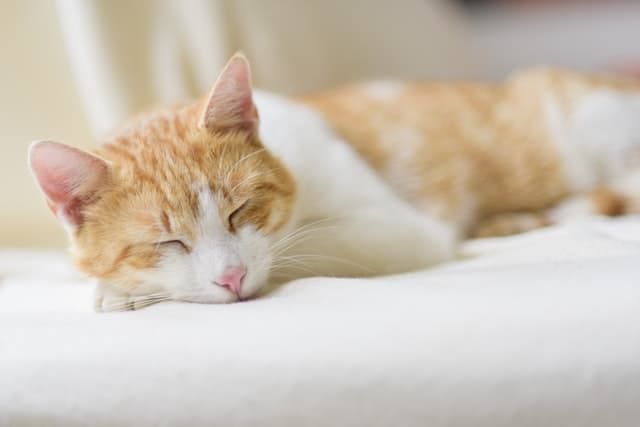Is your feline elderly and breathing heavily when resting? Let’s see together why the cat breathes fast when it sleeps.

The respiratory rate of a healthy feline is 20-30 breaths per minute. When the cat begins to breathe differently, it means that there is something wrong with our four-legged friend.
In fact, there are many reasons why cats breathe quickly, especially when resting, and are often linked to some pathologies.
Most of the time we can find this problem in older felines. Let’s see below why the cat breathes fast when sleeping.
Why does my cat breathe fast when sleeping?

The respiratory system of the feline, of other animals and also of man, is the most important part of the cat’s body, as a minimum respiratory problem compromises the whole organism of the animal.
For this reason it is very important to treat any type of respiratory problem present in the feline as soon as possible. To highlight any problems in the cat it is advisable to check its breathing.
As previously mentioned, a healthy cat’s breathing varies from 20 to 30 breaths per minute. When our four-legged friend has some problems, the frequency of breaths changes, it can be less or more.
There are 3 types of breathing that can make us understand that the cat is not well:
- Dyspnea in the cat
- Panting of the cat
- Tachypnea.
The tachypnea is just the medical term for fast breathing of our furry friend.
This disorder is not considered a problem if it occurs in the cat after a long exercise, but it is worrying when the cat breathes fast especially while sleeping.
If your furry friend suffers from tachypnea, you will notice the cat breathing rapidly with his mouth closed or open, in the latter case he could also have his tongue sticking out. You will also notice her hips swelling and deflating rapidly.
Tachypnea in cats: causes
If the cat is breathing fast, the cause could be heat or stress, but the cat could also have various diseases.
Such diseases can both be related to the respiratory system, such as:
- Diseases of the larynx
- Presence of lymph nodes in the chest cavity
- Lung disease in cats
- Bronchial diseases
- Presence of fluid in the chest cavity
- Presence of air in the thoracic cavity
Both are not related to the respiratory system, such as:
- Inflammations
- Trauma
- Heart disease in cats
- Feline diabetes
- Hyperthyroidism in cats
- Feline anemia
- Abdominal diseases
- Tumors.
As tachypnea is a symptom linked to many diseases, you should contact your vet if you notice your cat breathing quickly when resting.
Tachypnea in cats: treatment
If your cat is hot or stressed and breathing quickly, you need to keep cat in a cool environment and do everything possible not to stress the cat.
If this is done, our four-legged friend continues to breathe quickly, especially when he sleeps, it is necessary to take him to the vet.
The latter with the various analyzes and various tests, will trace the cause of the tachypnea and prescribe the right therapy to the cat. It is our job, for the health of our furry friend, to follow everything the specialist says.
We remind you that it is very important to treat tachypnea in cats in time, to prevent it from becoming dyspnea and putting the life of our beloved feline at risk.






